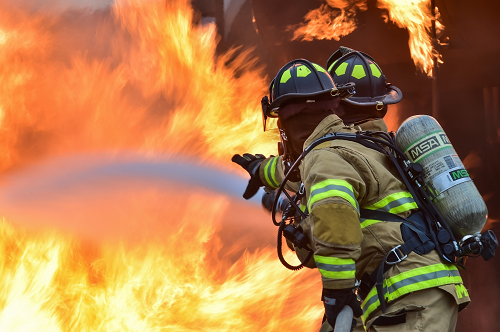TUESDAY, APRIL 12, 2022
Lint is the fuzzy stuff that comes out of your pocket with your change when buying something at a store. It seems harmless enough except that in large quantities, it is extremely flammable. The reason is that it has a lot of surface area for a flame to take hold. It also contains lots of trapped air which helps to support combustion. Lint buildup combined with a heat source is a fire waiting to happen. Two common lint fire hazards in the home are discussed next.
The Dryer
Well over 10,000 fires occur every year because of lint buildup in clothes dryers. Lint in drying clothes gets trapped in the lint filter and is deposited along the inside walls of the dryer vent hose. With time, dangerous amounts of lint builds up in these two areas. While many people frequently clean out their lint filter, they often forget about the buildup occurring inside the vent hose. However, there are a number of telltale signs that you have a lint buildup problem in your dryer.
Excessive lint in your filter and dryer vent restricts air flow. This means your clothes will take longer to dry. Reduced airflow means that heat doesn't get vented outside, which causes your dryer and clothes to get very hot. The room also gets humid and windows may fog up in cold weather because the clothing moisture isn't being vented outside. When lint buildup gets really bad, it can back up into the drum casing. Reduced airflow also means that the dryer vent flap opens up very little, if at all. You may also see lint on the ground beneath the vent flap.
In addition to frequent cleaning of the lint filter, get the vent hose and duct system checked and cleaned once a year at a minimum.
The Bathroom Ceiling Exhaust Fan
The ceiling exhaust fan is used to remove moist air from showering to prevent the walls and mirrors from becoming damp. Dust particles cling to the moisture and are slowly deposited in the fan motor compartment and on the motor itself. Lint is an insulator, which traps heat around the motor. If the motor overheats enough, the lint will ignite.
Check and clean your exhaust fan on a regular basis. The motor should have thermal protection, which turns off power to the motor if it gets too warm. Motors over twenty years old may not have this feature.
Stay on top of all possible fire hazards in your home including lint buildup in your dryer and bathroom exhaust fans. While your home insurance policy mitigates the financial loss of a fire, no one ever wants to experience such an event in the first place. Prevention keeps your home and family safe and your home insurance rates lower.
We’ve got you covered. Call Bromell Agency, Inc. at (318) 251-1212 for more information on home insurance.
No Comments
Post a Comment |
|
Required
|
|
Required (Not Displayed)
|
|
Required
|
All comments are moderated and stripped of HTML.
|
|
|
|
|
|
NOTICE: This blog and website are made available by the publisher for educational and informational purposes only.
It is not be used as a substitute for competent insurance, legal, or tax advice from a licensed professional
in your state. By using this blog site you understand that there is no broker client relationship between
you and the blog and website publisher.
|
Blog Archive
2026
2025
2024
2023
2022
2021
2020
2019
2018
2017
2016
2015
2014
2013
|
|
| Referrals |
| We love referrals! And thank you even more for your continued business. |
| Customer Service |
| Self policy service any time of the day, directly from our website. |
| Join Our Newsletter |
| Stay in touch with the latest events, news and offers we have. |
|